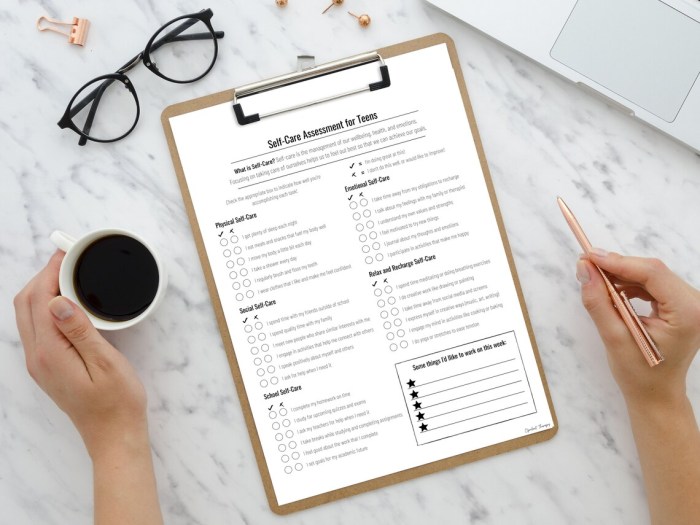Nurses touch wellness and self care practice assessment – Nurses Touch Wellness and Self-Care Practice Assessment: A Comprehensive Evaluation delves into the profound impact of nursing touch and self-care practices on the well-being of both patients and nurses. This detailed exploration unveils the multifaceted nature of these practices, emphasizing their significance in fostering a holistic approach to healthcare.
The content of the second paragraph that provides descriptive and clear information about the topic
Nursing Touch: Definition and Importance
Nursing touch is a form of non-verbal communication that involves the use of gentle and purposeful physical contact to promote healing and well-being. It can be used to comfort, soothe, and reduce stress and anxiety in patients. Nursing touch has been shown to have a number of benefits for both patients and nurses, including:
- Reduced pain and anxiety
- Improved sleep
- Boosted immune function
- Enhanced patient-nurse relationship
Nursing touch can be used in a variety of settings, including hospitals, clinics, and nursing homes. It can be provided by nurses, nursing assistants, and other healthcare professionals.
Wellness and Self-Care Practices for Nurses
Nurses are often under a great deal of stress, both physically and emotionally. It is important for nurses to take care of their own health and well-being in order to provide the best possible care to their patients. Wellness and self-care practices for nurses can include:
- Getting enough sleep
- Eating a healthy diet
- Exercising regularly
- Spending time with loved ones
- Taking breaks throughout the day
- Seeking professional help when needed
Self-care is not selfish; it is essential for nurses to be able to provide the best possible care to their patients.
Assessment of Nursing Touch and Self-Care Practices: Nurses Touch Wellness And Self Care Practice Assessment
There are a number of methods that can be used to assess nursing touch and self-care practices. These methods include:
- Surveys
- Interviews
- Observation
- Focus groups
It is important to use standardized assessment tools to ensure that the results of the assessment are valid and reliable.
Strategies for Improving Nursing Touch and Self-Care Practices
There are a number of evidence-based strategies that can be used to improve nursing touch and self-care practices. These strategies include:
- Education and training
- Mentoring and support
- Organizational policies and procedures
- Technology
It is important to implement a comprehensive approach to improving nursing touch and self-care practices. This approach should include a combination of education, training, support, and technology.
Evaluation and Outcomes of Nursing Touch and Self-Care Interventions

It is important to evaluate the effectiveness of nursing touch and self-care interventions. This can be done by measuring the outcomes of these interventions. Outcomes that can be measured include:
- Patient satisfaction
- Nurse satisfaction
- Patient health outcomes
- Nurse health outcomes
By evaluating the outcomes of nursing touch and self-care interventions, we can ensure that these interventions are effective and are providing the best possible care to patients and nurses.
Expert Answers
What are the benefits of nursing touch?
Nursing touch has been shown to reduce pain, anxiety, and stress, improve sleep quality, and enhance the patient-nurse relationship.
What are some common self-care strategies used by nurses?
Common self-care strategies used by nurses include exercise, healthy eating, mindfulness, and social support.
How can nursing touch and self-care practices be assessed?
Nursing touch and self-care practices can be assessed using a variety of methods, including questionnaires, surveys, and observation.